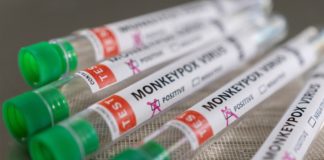Dallas Voice recaps the top stories of 2022, from the midterm elections to the war on drag
What a year: 2022 began with a law targeting transgender youth in sports going into effect, and it ends with the astounding news that Texas Attorney General Ken Paxton tried to get the Department of Public Safety to compile for him a list of people who had changed the gender markers on their Texas driver’s licenses and state IDs.
Between then and now, we saw Gov. Abbott try to criminalize health care for trans youth; mPox replaced COVID as the epidemic to watch out for, the “red wave” fizzled thanks in part to “blue” outrage over the demise of Roe v. Wade, Pride returned to Dallas times two, the right wing waged war on drag, and anti-LGBTQ rhetoric led to a deadly shooting at a Colorado Springs bar.

Pride in Dallas Grand Marshal Kirk Myers
The North Texas LGBTQ community lost long-time community leaders in 2022, and we saw new leaders step up. And after two years of COVID-induced cancellations, delays and re-envisioning, we saw many of our traditional events return in full force, including the MetroBall in June and, in September this year, Black Tie Dinner.
This week and next (our Dec. 23 and 30 issues) Dallas Voice takes a look back at the top stories and big events of 2022.
Midterm elections and the washed-out ‘red wave’
Historically, the party that holds the White House tends to perform poorly in midterm elections, and with the GOP continually pushing a largely false narrative of rising inflation and a poor economy, most people expected to see some sort of “red wave” in the 2022 midterms, with Republicans gaining control of both Houses of Congress.
But then in early May, a draft of a U.S. Supreme Court ruling overturning Roe v. Wade and allowing states to once again ban abortions, was leaked. In late June, SCOTUS — stacked with rightwing extremists thanks to Trump — officially released that ruling. And as the outrage began building, the GOP saw its expected red wave fading as the push for progressive voters to show up at the polls grew stronger. At the national level, Democrats retained control of the Senate and even gained a seat (until Arizona Sen. Kyrsten Sinema announced earlier this month she was leaving the Democratic Party to become an independent). The GOP did gain control of the House but only by a very slim margin.
In Texas, Republicans retained control of all the statewide offices and the Legislature, with Gov. Greg Abbott defeating Beto O’Rourke and indicted-and-under-federal-investigation Attorney General Ken Paxton also winning re-election. But there were some bright spots even in Texas for LGBTQ voters.
Texas has a very long election season that begins with the earliest filing deadline to qualify for the earliest primary in the country. All statewide offices were up for grabs in 2022, as well as all legislative and congressional seats.
Across the country, the LGBTQ Victory Fund, for the first time, counted more than 1,000 LGBTQ candidates filed to run in primaries, and then a record number of those candidates won their primaries to make it to the general election.
Texas saw a record number of LGBTQ candidates stand for election as well. Five of the six LGBTQ members of the Texas House ran for re-election. The sixth was Celia Israel, who decided to run for mayor of Austin. Israel had the most votes on election day, but didn’t get 50 percent. In her runoff, she lost by 886 votes.
The other five House members were re-elected.
When state Rep. Garnet Coleman retired during his term in office due to health reasons, former Houston City Councilwoman Jolanda Jones, who had already entered the primary, won a special election to fill the seat. Her victory grew the LGBTQ Legislative Caucus to seven members.
Former state Rep. Glen Maxey commented on Jones, saying, “The Texas Legislature is not ready for Jolanda Jones.”
Six additional LGBTQ candidates ran for office, including Venton Jones in Dallas and Christian Manual Hayes in Beaumont. Both Jones and Manual Hayes won their elections and will become the first out Black men to serve in the Texas Legislature. Jones will be the first state rep who is open about his HIV-positive status.
And the caucus will grow to eight members.
Jones is filling a seat that includes the Design District, downtown and parts of West Dallas, East Dallas and the Fair Park area. He replaces Jasmine Crockett, who served a single term before winning election to Congress, replacing legendary lawmaker U.S. Rep. Eddie Bernice Johnson, who championed the LGBTQ community throughout her career.
Four other out candidates ran unsuccessfully for state House seats and one for a state Senate seat around the state — including Shannon Elkins who tried for a seat based in Tarrant County and Josh Tutt who ran for a state Senate seat in South Texas. Lesbians challenged but lost elections against U.S. Reps. Chip Roy in Austin and Pete Sessions in Waco. When the out-of-touch Sessions represented a Dallas district that included part of Oak Lawn, he once famously declared he had no gay people living in his district.
Across the country, LGBTQ candidates did well. Massachusetts and Oregon both will have lesbian governors — Maura Healey and Tina Kotek — and Colorado re-elected openly gay Jared Polis. In Louisiana, Davante Lewis was elected public service commissioner, the first out candidate elected to statewide office in that state. In California, Robert Garcia will be the first openly LGBTQ immigrant elected to Congress. And more transgender, non-binary and gender nonconforming candidates were elected to office than ever before.
— David Taffet
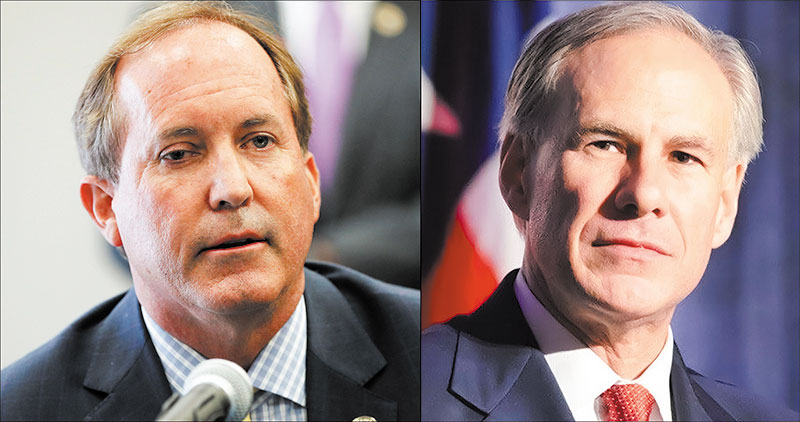
Attorney General Ken Paxton, left, and Gov. Greg Abbott tried to criminalize health care for transgender youth in 2022.
Transgender Texans under fire again
Transgender Texans — especially trans youth — have long been a favorite target for right-wing lawmakers in the Legislature. Especially since the U.S. Supreme Court’s June 2015 Obergefell ruling, anti-LGBTQ forces disappointed at “losing” the battle over marriage equality have turned their focus to those they saw as the LGBTQ community’s most vulnerable — transgender people, especially transgender youth.
It started in 2017 then in 2019 with Lt. Gov. Dan Patrick’s ultimately unsuccessful crusade to ban trans people from using the appropriate public restrooms, and continued in 2021 when it took three special sessions for Republicans to force their anti-trans school sports bill through to passage. That law passed in 2021, banning trans children from participating in gender-specific public school sports (unless they participate based on the gender recorded on their birth certificate at birth), and it took effect in January this year.
Then on Feb. 22, just seven days before the Texas Primaries, Gov. Greg Abbott ramped up the state’s ongoing war against its own transgender residents when he ordered the state Department of Family and Protective Services to launch child abuse investigations into parents providing their transgender children access to trans-supportive health care and to the healthcare professionals providing such care. Abbott also ordered “mandatory reporters” — teachers, healthcare professionals, etc., who are required by law to report suspected abuse — to report those families to DFPS.
Abbott based his order on a legal opinion issued by Attorney General Ken Paxton which has since been widely discredited by legal experts. Considering that Abbott and Paxton both faced challengers in the GOP Primary, the order could certainly be seen as a transparent effort at ginning up their support among the far right GOP base.
On March 1, a DFPS employee with a transgender child and a therapist filed suit challenging the order. A Travis County District Court issued a temporary restraining order stopping all the investigations. The state Supreme Court eventually ruled that the TRO stopping the investigation into the plaintiff family would stand, but that other investigations could resume. A second lawsuit on behalf of PFLAG and three Texas families was then filed, and, in July the same Travis County District Court enjoined from “investigating members of PFLAG, including but not limited to plaintiff families.” That TRO remains in effect, but the state is appealing.
But then, earlier this month, the Washington Post published an investigative report detailing Paxton’s efforts — after bypassing proper channels — to get the Texas Department of Public Safety’s driver’s license office to compile a list of every person who, over the previous two years, had their gender marker changed on their Texas driver’s license or state ID. A DPS spokesman told The Post that, after finding 16,000 such instances, it was determined that the list Paxton requested would have to be compiled manually, and that it was not possible to do so.
Paxton’s office has apparently denied making the request and has refused further comment. The DPS spokesman said the request was “verbal,” which means there is no paper trail.
Jurnee Richard, transgender intervention specialist with Abounding Prosperity Inc., called Paxton’s request “alarming,” saying that coming as it does when Roe v. Wade has been overturned, voting rights are threatened and Americans are losing constitutional rights, “This news only evokes more fear for the LGBTQ+ community.”
Transgender advocate Leslie McMurray said that the big question is what Paxton intended to do with that information: “If I were to speculate, I would say it may be connected to the trans healthcare bill that would define affirming medically necessary care for transitioning juveniles as child abuse. This could be a way for Texas to create a ‘Rolodex’ of names to investigate, perhaps.
“If so,” she continued, “that would be chilling. I can’t fathom a legitimate need for this information, and, to my knowledge, this kind of document request is unprecedented and reprehensible.”
— Tammye Nash
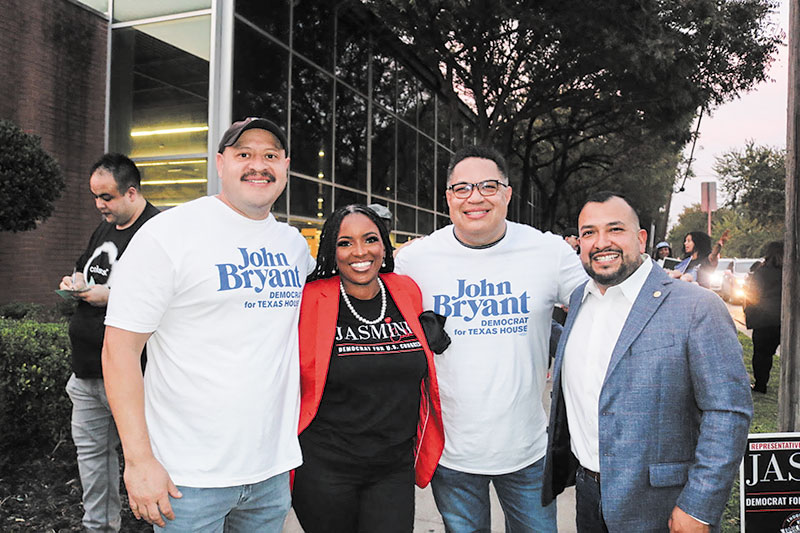
Candidates and supporters including, from left, Adam Medrano, Jasmine Crockett, Omar Narvaez and Jesse Moreno gather outside the Oak Lawn Library. (David Taffet/ Dallas Voice)
mPox threatens LGBTQ community
Just as the country was emerging from two years of lockdown and separation from friends and loved ones in response to the COVID pandemic, monkeypox, now renamed mPox, began to spread in May.
As recently as January 2022, the bars on Cedar Springs had shut down because of a COVID surge. That lasted only a few weeks as the new variant proved to be less deadly. But the news about mPox wasn’t good for the LGBTQ community: Just weeks before the beginning of Pride Month, the Centers for Disease Control released information that the few mPox cases that had been suspected or verified in western Europe and the U.S. had mostly affected gay or bi men.
According to the CDC, mPox was first discovered in 1958 when two outbreaks of a pox-like disease occurred in colonies of monkeys kept for research, hence the name.
The first human case was recorded in 1970. This year’s outbreak in the U.S. began with a case in Massachusetts. A second suspected case followed in New York. Within weeks, other cases — all related to travel — began popping up around the country.
Monkeypox is transmitted through close personal contact but is not considered a sexually transmitted disease, although it will spread during sexual contact. Unlike the coronavirus, it is not spread through the air; transmission of mPox virus occurs when a person comes into contact with the virus from an animal, human or materials contaminated with the virus.
The symptoms are fever, headache, muscle aches, backache, swollen lymph nodes, chills and exhaustion as well as pox especially on the face, arms and legs.
A vaccine to prevent mPox already existed, but ramping up production of that vaccine took the entire summer. Because the virus was spreading through the gay community, gay men were encouraged to get the vaccine. In addition to the Dallas County health department, Abounding Prosperity has been the principle site for mPox vaccination in Dallas. HELP Center has been Fort Worth’s main distributor of the shot.
As mPox spread, several events in the LGBTQ community were canceled. S4 canceled the August circuit party Release. In late September, Dallas Southern Pride canceled its weekend of events.
The Biden administration has been closely monitoring the progress in overcoming another epidemic. While the number of new cases has subsided, as recently as mid-November, the White House held a briefing for interested parties in the DFW area and encouraged continued vaccination.
Texas is one of just six states that have had more than 500 cases of mPox. Across the country, more than 1 million people have been vaccinated against the disease.
— David Taffet
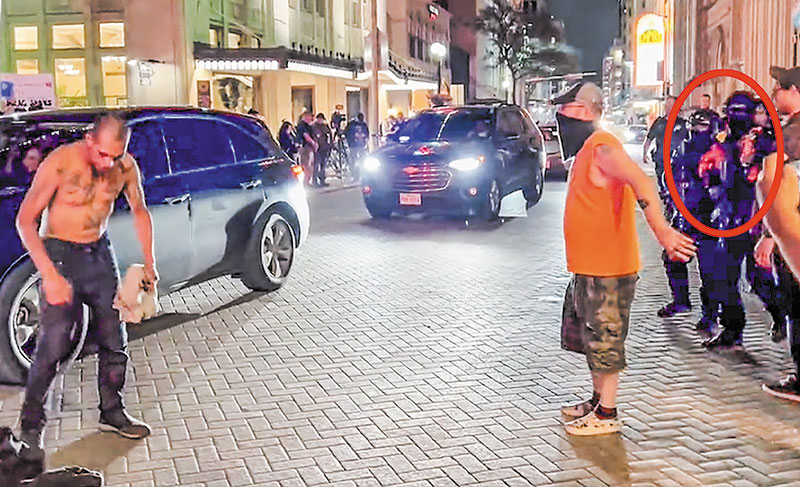
War on drag leads to threats, violence
Drag has long been a uniquely LGBTQ art form. And drag queens have been heroes of the LGBTQ community at least as far back as the Stonewall Riots in 1969. And starting in the 1980s as the AIDS epidemic was ravaging the community and the government and most of mainstream America stood idly by, it was the drag queens who stepped up and began staging benefit shows to raise money to care for those dying with the virus — from funding HIV/AIDS services ranging from guerilla medical clinics like those offering pentamidine mist treatments to fight AIDS-related pneumonia to pay insurance premiums for those who had lost their jobs to buying groceries for people with AIDS and more.
Still today, benefit shows are raising hundreds of thousands — millions, even — of dollars each year for LGBTQ agencies, organizations and individuals in need. And, thanks in no small part to RuPaul’s Drag Race and its spinoffs, drag has become big business and a phenomenon even in the mainstream.
But in 2022, rightwing extremists turned their attention to the drag scene, leaving many queens feeling that they have large targets painted on their backs.
In North Texas, the first really visible sign that there was a war on drag came on June 4, the first Saturday in the 2022 Pride Month calendar. While hundreds of LGBTQ people and their allies were headed to Fair Park for the first live and in-person Dallas Pride celebration since 2019. Mr. Misster, a bar on Cedar Springs, was welcoming families to a special kid-friendly show and story hour. The event was held hours before the bar opened for regular business, and no alcohol was being served.
But Kelly Neidert — who had just graduated from the University of North Texas in Denton after spending the previous several months harassing LGBTQ students, especially transgender students there — had sent out a call among right-wing circles for people to show up and protest the event.
It was the first of several such protests, many coordinated by Neidert, to happen in North Texas and around the country since then. Many of those who show up to protest have been known members of rightwing extremists groups, such as the Proud Boys and the Oath Keepers, and protesters have frequently been aggressive and confrontational with people trying to attend these drag events.
Some protesters have come armed, as well. But anti-drag protesters who showed up at a drag brunch at the Anderson Distillery and Grill in Roanoke in late August were surprised to find themselves facing armed members of the local John Brown Gun Club who said they were there to provide security for the event.
A similar situation unfolded in San Antonio earlier this month when members of the rightwing This Is Texas Freedom Force, allegedly joined by some members of the gay Republican group Log Cabin Republicans, showed up to protest outside a drag show being held at a downtown theater. Again protesters found themselves facing — and outnumbered about 4-1 by — counter-protesters, some of whom were armed and standing guard.
It was confirmed that members of the John Brown Gun Club were in attendance there, too.
Even though the crowds turning out to support the drag queens and their events have usually outnumbered those there to protest, the virulent hate speech labeling drag queens as “groomers” and pedophiles has resulted in threats of violence ending in many shows and events being cancelled. And in at least two cases, the war on drag may have led to violence and deaths.
Earlier this month, two power substations serving Southern Pines, N.C., were damaged by gunfire just as a drag show was set to begin at a downtown venue, leaving more than 40,000 people without power for several days. Although law enforcement officials have said they don’t know why the town was targeted, one former Army officer who was investigated after attending the Jan. 6, 2021 rally in Washington, D.C., posted on Facebook insinuating that the attack was carried out specifically to stop the drag show. Officials interviewed her and said that she was spreading false information.
But a far more deadly incident most likely sparked at least in part by the anti-drag/anti-transgender/anti-LGBTQ LGBTQ rhetoric of the rightwing was the Nov. 19 mass shooting at Club Q, a Colorado Springs LGBTQ bar.
Five people were killed and several others wounded when a man carrying what officials described as an “AR-15-style” long gun and a handgun, and wearing a military-style flak jacket and helmet walked into the bar shortly before midnight and started shooting. He was quickly tackled and subdued by a man attending the drag show that had been advertised as happening that night and another patron, as well as a transgender woman who kicked the gunman.
Anderson Lee Aldrich, 22, was arrested that night and is facing 305 charges, including first degree murder and attempted first-degree murder. His estranged father, a former porn star, told media that when he was told his son was arrested for the shooting, his first concern was that his son was gay, and that he was relieved to find out that rather than being gay, his son had attacked LGBTQ people.
Local brewery owner Richard Fiero, a retired Army veteran, was at Club Q with his family and friends for the drag show when he heard the gunfire start. He immediately ran to tackle the gunman, taking away the shooter’s handgun and beating him with it. Fiero’s daughter’s longtime boyfriend, Raymond Green Vance, was one of the five people killed that night. Other victims were bar employees Daniel Aston and Derrick Rump, and patrons Ashley Paugh and trans woman Kelly Loving,.
Gay Navy serviceman Thomas James was also in the bar that night, and he was the one who kicked away the fallen gunman’s rifle and helped Fiero subdue him. The name of the trans woman who helped is not known.
— Tammye Nash
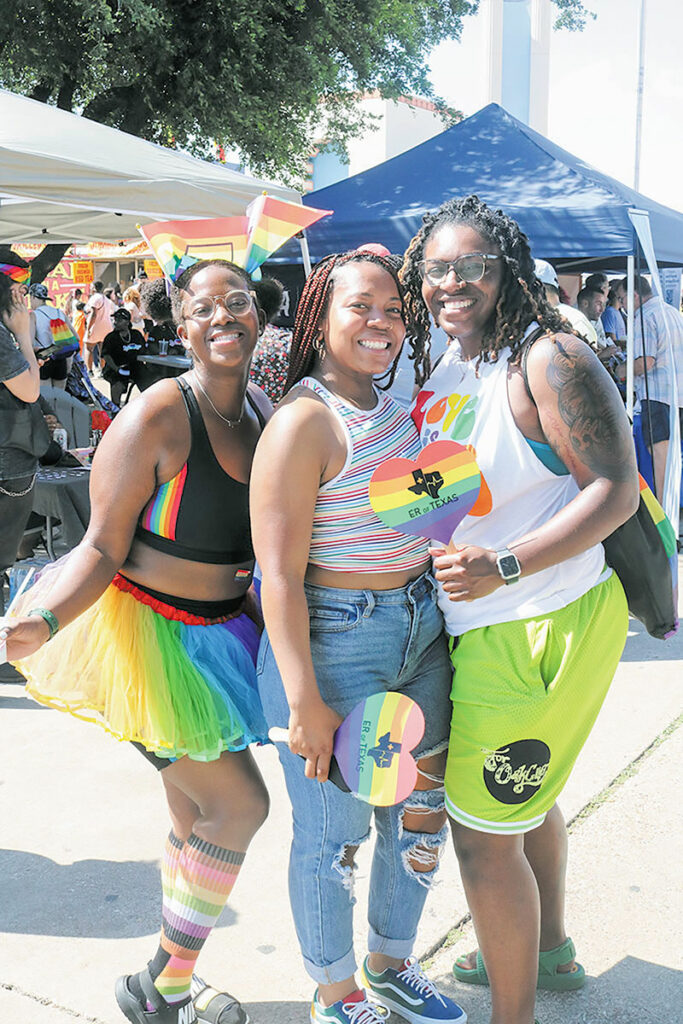
Pride times 2
After one year of virtual events and one year of stage shows due to COVID, Dallas Pride returned in force in 2022, with the Miller Lite Music Festival in the Park on Saturday, June 4, followed on Sunday, June 5, by the return of the Alan Ross Texas Freedom Parade, both events happening again at Fair Park.
Drag superstar Shangela headlined the entertainment on Saturday. And Sunday’s parade featured a record number of entries. Grand marshals for the parade were Danny “Liquor Mini” Cabrera, David Hearn, James “Cassie Nova” Love, Bill “Linze Serrell” Lindsey and his late husband Michael “Sable Alexander” Champion, former Dallas Mayor Pro Tem Adam Medrano and Andrews Distributing Account Manager Kristi Wilson.
The seven had been named grand marshals for 2020, but since those events were canceled due to COVID, Dallas Pride organizers chose to honor them again this year.
When the committee that organizes Dallas Pride each year moved the celebration to June in Fair Park rather than September in Oak Lawn, they did so, they said, to make the event part of the worldwide Pride Month celebration, and to give the events room to grow while at the same time trimming expenses.
But since the discussion about moving Pride first began, there have been those who adamantly objected. Pride, at least in Dallas, belongs in the Gayborhood and in September, they said.
This year, a committee led by James Ware created Pride in Dallas and, on the third weekend in September, staged a Pride parade once again down Cedar Springs Road. Grand marshal for the parade, chosen by the community, was Abounding Prosperity CEO and President Kirk Myers.
Hundreds of people crowded onto the Cedar Springs Strip for the inaugural Pride in Dallas parade, which was funded in part by crowd-sourcing, and organizers have pledged to return next year with an even bigger parade and more events.
And organizers for both events — Dallas Pride and Pride in Dallas — say they are not competing with each other. There is, they say, enough Pride to go around.
— Tammye Nash
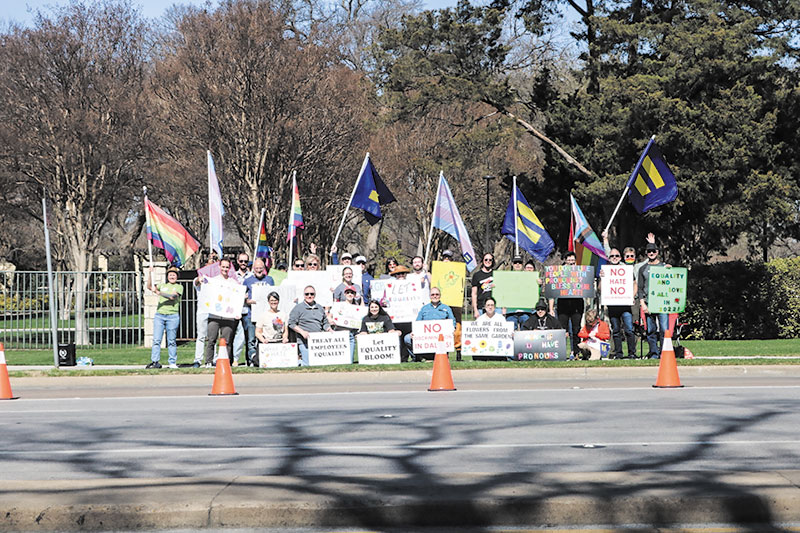
Claims of discrimination sparked protests at Dallas Arboretum. (David Taffet/Dallas Voice)
Dallas Aboretum faces allegations of discrimination
A former employee of the Dallas Arboretum and Botanical Society Inc. filed complaints with both the EEOC and the city of Dallas Office of Fair Housing and Human Rights in January, saying that their former bosses discriminated against them based on their sexual orientation, gender identity and mental and physical disabilities. Lambda Legal represented the employee.
In June, Lambda Legal filed a second EEOC complaint against Dallas Arboretum on behalf of another former employee who said he was fired after his bosses at the Arboretum found out he was gay. In each case, fingers have been pointed at Mary Brinegar, president and CEO, as the source of the discrimination.
Protests at the facility began even before the second complaint was filed. Longtime activist Steve Atkinson organized the protests that began in April and continued through June. At the first protest, Dallas City Councilman Adam Bazaldua met the group picketing at the Arboretum’s entrance and assured them the charges were being looked at seriously.
In June, Cece Cox, Atkinson and Kate Newman sent a letter to the board to the Dallas Arboretum, and less than a week later, Board Chair Jim Ryan responded.
In his letter, Ryan outlined the steps the board was taking to address charges of employment discrimination. On June 16, the board held a special meeting to address the charges, and an ad hoc committee was appointed.
Among those steps are changes made to the employee manual and the diversity, equity and inclusion policy. A human resources consultant was hired, and mandatory training entitled “Our Respectful Workplace” is being implemented. And to settle a lawsuit by the former employee, the board hoped to be able to negotiate a settlement with Lambda Legal.
Brinegar finally submitted her retirement letter in October without mentioning the controversies. After months of protests and employment discrimination lawsuits filed against the facility, the target of those demonstrations didn’t announce a date she will leave, but indicated she planned to be part of a smooth transition.
— David Taffet
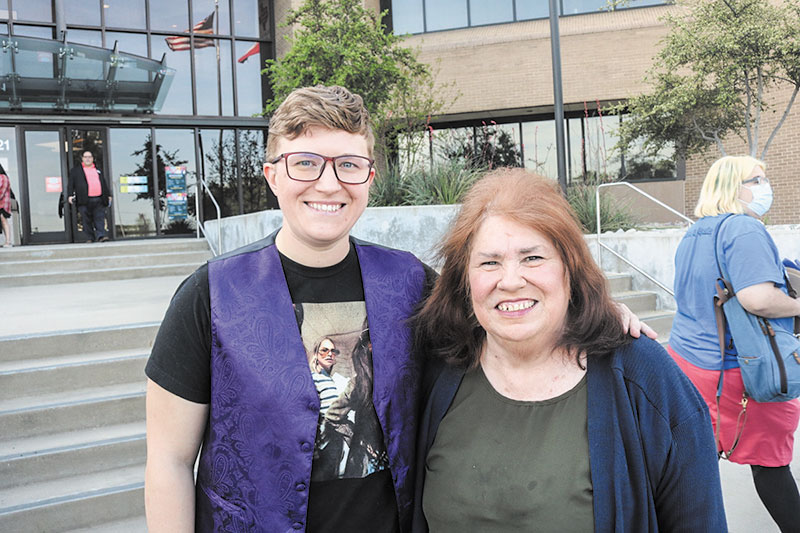
Irving ISD fired teacher Rachel Stonecipher, pictured here with Rep. Terry Meza, when Stonecipher questioned a new principal’s possibly anti-LGBTQ decisions. (David Taffet/Dallas Voice)
No safe spaces in Irving ISD
Last fall, the new principal at Irving’s MacArthur High School, at the beginning of the 2021-22 school year, decided to protect students by having “Safe Space” stickers removed from classrooms and other areas in the school.
Principal Natasha Stewart, who had the stickers removed without notifying anyone beforehand, claimed she made the change because the whole campus was a safe space, and the stickers made it seem as if students wouldn’t be safe outside those specific classrooms.
When two teachers — one being LGBTQ teacher Rachel Stonecipher — questioned her decision, Stewart had both teachers removed from the classroom.
Former students and other community members attended an Irving ISD meeting on Monday evening, April 18, to support Stonecipher. The group of 35 supporters included Texas state Rep. Terry Meza and Resource Center’s Rafael McDonnell. McDonnell told the crowd on the steps of IISD headquarters that he’d been working for more than half a decade to have the school district implement a non-discrimination policy.
Meza said she encouraged the school district to adopt a welcoming resolution for immigrant children. While Irving overwhelmingly defeated her resolution, Grand Prairie adopted an amended version that also included LGBTQ students.
During the public comment portion of the IISD meeting, student after student stood to say, “I’m here in support of Miss Stonecipher.” One student described Stonecipher as a critical part of the success of students at MacArthur.
Student Elle Caldon said, “She was my writing coach. She encouraged me to try new things.” Since Stonecipher’s removal from the campus, Caldon said, the Gay Straight Alliance is gone, the journalism class has produced no school newspaper and the philosophy club is defunct.
The claim against Safe Space stickers was that it implied classrooms without stickers weren’t safe for LGBTQ students. The principal claimed the entire campus is a safe space. But one student told the board, “One teacher made fun of my rainbow bandana. You claim we should feel safe at school. We don’t.”
School board members voted at the end of the meeting to terminate Stonecipher’s contract.
— David Taffet








